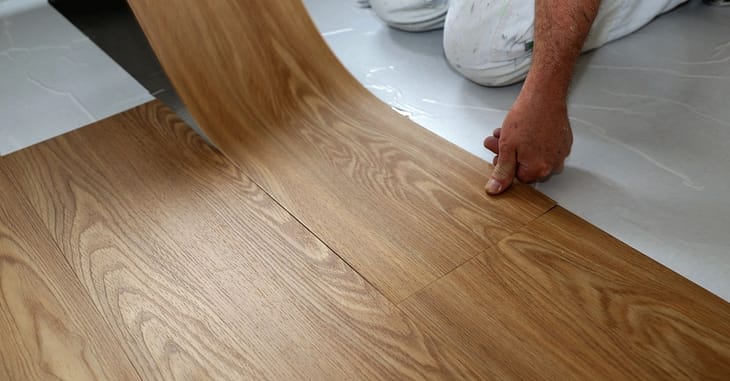When it comes to selecting flooring for rental properties, landlords and property managers must weigh several factors, such as durability, ease of maintenance, and cost-effectiveness.
Flooring is not just a foundational aspect of a property’s aesthetics; it also plays a crucial role in the long-term maintenance and appeal of the property.
Among the various options available, vinyl flooring stands out as an exceptional choice. This material offers a blend of practical benefits that align well with the needs of rental spaces, particularly those subject to high turnover and diverse tenant usage.
Vinyl flooring has surged in popularity due to its robust features that cater specifically to the challenges of rental properties. This type of flooring is designed to withstand heavy foot traffic, resist water and stains, and maintain its appearance over time, all while being budget-friendly.
As we delve deeper into the specific advantages of vinyl flooring, it becomes clear why many property owners prefer this material for their rental units, from compact city apartments to sprawling suburban homes.
Overview of Vinyl Flooring
Vinyl flooring is a synthetic material known for its durability and versatility. It is composed primarily of polyvinyl chloride (PVC), which is engineered to endure substantial wear and tear.
This makes it an excellent choice for rental properties, where flooring must withstand the constant comings and goings of tenants.
Vinyl is also adaptable in terms of design, offering a wide range of colours and patterns that can mimic more expensive flooring types like hardwood and stone.
The appeal of vinyl flooring extends beyond its physical attributes. Its construction allows for comfort underfoot that is softer than wood or tile, a quality that tenants will appreciate.
Additionally, vinyl’s sound-dampening properties contribute to quieter living spaces, an important consideration in multi-unit dwellings. As landlords look for materials that combine functionality with tenant appeal, vinyl flooring emerges as a leading choice.
Water Resistance and Hygiene
One of the standout features of vinyl flooring is its excellent water resistance, making it ideal for areas in rental properties that are prone to moisture and spills, such as bathrooms, kitchens, and utility rooms.
Unlike laminate or hardwood floors, vinyl does not warp or stain when exposed to water, ensuring that it remains in top condition even in the most challenging environments.
This moisture resistance also helps in preventing the growth of mould and mildew, which are common concerns in wet areas.
From a hygiene perspective, vinyl flooring is non-porous, which means it doesn’t harbour bacteria or allergens. This characteristic is particularly beneficial in rental properties, where health and safety standards are paramount.
Easy to clean and disinfect, vinyl flooring helps maintain a sanitary environment with minimal effort.
This is a crucial selling point for potential tenants who prioritise cleanliness and health, especially in the current climate where hygiene has become more important than ever.
Ease of Cleaning
The ease of maintaining vinyl flooring is another significant benefit for rental properties. Unlike carpets, which require regular deep cleaning to remain fresh, vinyl flooring can be kept in excellent condition with simple and infrequent cleaning.
Routine sweeping and occasional mopping with mild detergents is sufficient to keep vinyl floors looking their best. This low-maintenance aspect is particularly appealing to landlords, as it reduces the need for professional cleaning services between tenancies.
Moreover, vinyl’s resistance to scratches and stains means that it doesn’t require special treatments or costly repairs. In rental settings, where quick turnarounds are often necessary, being able to efficiently clean and prepare the unit for the next tenant is invaluable.
The practicality of vinyl flooring in this regard ensures that the property remains attractive to prospective renters, significantly reducing vacancy periods and maintenance costs.

Suitability for Various Property Areas
The versatility of vinyl flooring allows it to be used in various areas of a property, not just in wet zones like kitchens and bathrooms but also in living rooms, bedrooms, and hallways.
This uniformity can create a cohesive look throughout the property, which is aesthetically pleasing and often preferred by tenants.
Whether it’s the stone look in the bathroom or the warm wood effect in the living areas, vinyl offers continuity in design across different spaces.
This adaptability is especially advantageous when the carpet is not suitable or desired, either due to allergy concerns or maintenance issues.
Vinyl flooring provides a hypoallergenic and easy-to-clean alternative that can still offer the warmth and comfort typically associated with carpeted floors.
For landlords, this means a broader appeal to potential tenants and fewer limitations on the use of space within the rental property.
Durability and Cost-Effectiveness
Durability is a critical factor in the flooring choice for rental properties, as frequent replacements can quickly escalate costs and complicate maintenance schedules. Vinyl flooring is renowned for its resilience and longevity.
It can handle heavy foot traffic and resists wear and tear, maintaining its appearance for years. This durability makes vinyl an economical choice in the long run, as it reduces the frequency of floor replacements or extensive repairs.
In terms of initial costs, vinyl flooring is also more affordable than many other flooring options, such as ceramic tiles or genuine hardwood. This cost-effectiveness is amplified by the minimal maintenance requirements and long lifespan of vinyl flooring.
For landlords, the combination of low upfront costs, reduced long-term maintenance, and durability makes vinyl an economically sensible choice for rental properties.
Conclusion
The benefits of vinyl flooring for rental properties are manifold and compelling. From superb water resistance and easy cleaning to its aesthetic versatility and exceptional durability, vinyl flooring offers an array of advantages that meet the unique demands of rental settings.
It enhances the functionality and appearance of a property and contributes to a healthier, more hygienic environment for tenants.
For landlords and property managers, choosing vinyl flooring means investing in a cost-effective, attractive, and practical solution that will serve their properties well over the long term.
With its myriad benefits, vinyl flooring is a wise choice for anyone looking to maximise the appeal and maintenance of their rental units.





